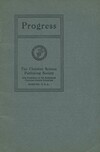

Are you sure?
This bookmark will be removed from all folders and any saved notes will be permanently removed.
The One Talent
All students of the Bible are familiar with Jesus' parable of the talents, which begins, "For the kingdom of heaven is as a man travelling into a far country, who called his own servants, and delivered unto them his goods." It then goes on to tell how he gave to one servant five talents, to another two talents, and to another one talent, "to every man according to his several ability," before starting on his journey. The narrative then describes how he that had received the five talents, by using them, succeeded in gaining five other talents. Likewise he that had received two talents gained two others. But he that had received the one talent listened to the suggestions of fear and slothfulness and, hiding that which he had received, gained nothing. The lord of those servants, in reckoning with them, said to each of those who had been faithful, diligent, and watchful, "Well done, thou good and faithful servant: thou hast been faithful over a few things, I will make thee ruler over many things: enter thou into the joy of thy lord." But for the wicked and unprofitable servant there was sharp rebuke, and an order given that the talent be taken from him and that he be cast into outer darkness.
Let us lift out thought of "talent" above the sense in which this word is usually used in describing some mental or physical ability or prowess, up to the sense in which Mrs. Eddy uses it when she says, beginning on page 366 of Science and Health, "If we would heal by the Spirit, we must not hide the talent of spiritual healing under the napkin of its form, nor bury the morale of Christian Science in the grave-clothes of its letter." Here we are brought face to face with the fact that as Christian Scientists we all possesses this talent in proportion to our understanding of this Science, and that it is incumbent on us all to use and improve our individual ability to heal, not alone so-called disease, but every sense of discord and limitation from which the human family is suffering. Our success in doing this determines the use we are making of our God-given ability and our progress in understanding God and man's relation to Him. Throughout the Bible and our Leader's writings, we find constant reminders that only as we use or put into practice that which we already know, shall we be able to apprehend and gain more.
Now how can we best learn to use profitably that which is being unfolded to us through the study of Christian Science, so that there may be constant progress and not stagnation? Mrs. Eddy has answered this question most comprehensively on page 116 of "Miscellaneous Writings," where she says, "Never absent from your post, never off guard, never ill-humored, never unready to work for God,—is obedience; being 'faithful over a few things.'"
Enjoy 1 free Sentinel article or audio program each month, including content from 1898 to today.
JSH Collections
This article is included in:
1921 - PAMPHLET
Progress
JSH-Online has hundreds of pamphlets, anthologies, and special editions for you to discover.

November 20, 1920 issue
View Issue-
The One Talent
ALICE K. METZ
-
God Is Principle
JOHN C. MAC LAREN
-
The Sanctuary
M. LYDIA BUTZBERGER
-
"My Father has my treasure"
NINA SEYMOUR KEAY
-
Causing Error to Cease
ADAM DICKSON
-
Our Abiding Place
ELSA F. ANGLE
-
Right Repudiation
MYRTLE NOBLE
-
Thanksgiving
Frederick Dixon
-
"Not as the flying"
Gustavus S. Paine
-
A Thanksgiving Testimony
MAUDE M. CLARKE
-
Brought up and educated in the home of grandparents,...
Pearl P. N. Babcock
-
Deep gratitude to God prompts me to give this testimony
Frieda Mühlbach
-
I wish to express gratitude for Christian Science and for...
Ward H. Dunphy
-
I am most grateful for some measure of understanding...
B. Hutchinson
-
Christian Science did not "come into my life,"—I did...
Dorothy Roberts, Olive W. Roberts
-
I am very grateful for the message Christian Science has...
Lillian I. Edwards
-
In the fall of 1913 I took up the study of Christian Science
T. O. Hayes with contributions from Mary Hayes
-
Nearly six years ago I was led to this glorious truth,...
Augusta E. Dobrinski
-
Signs of the Times
with contributions from Eugene L. Fisk


